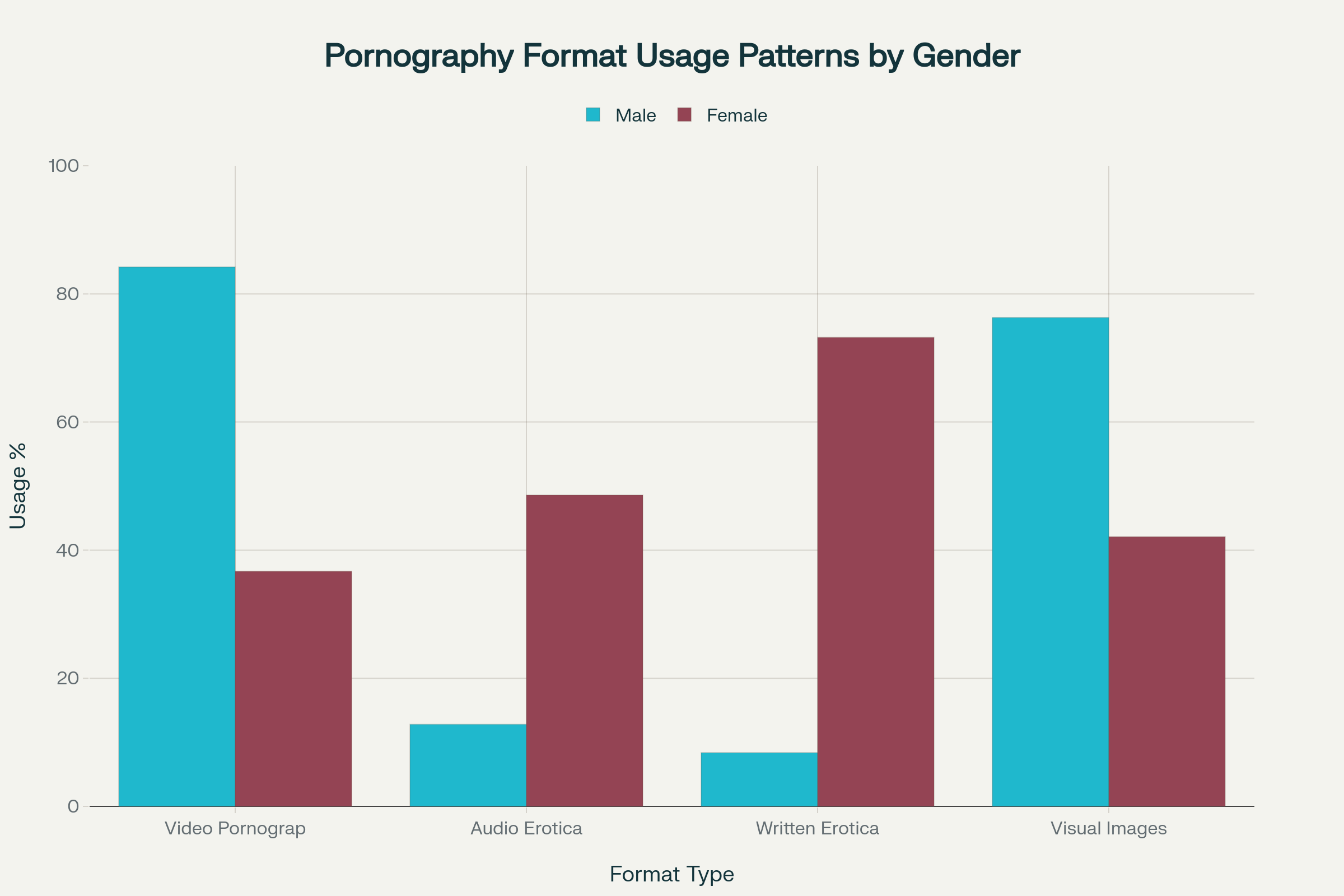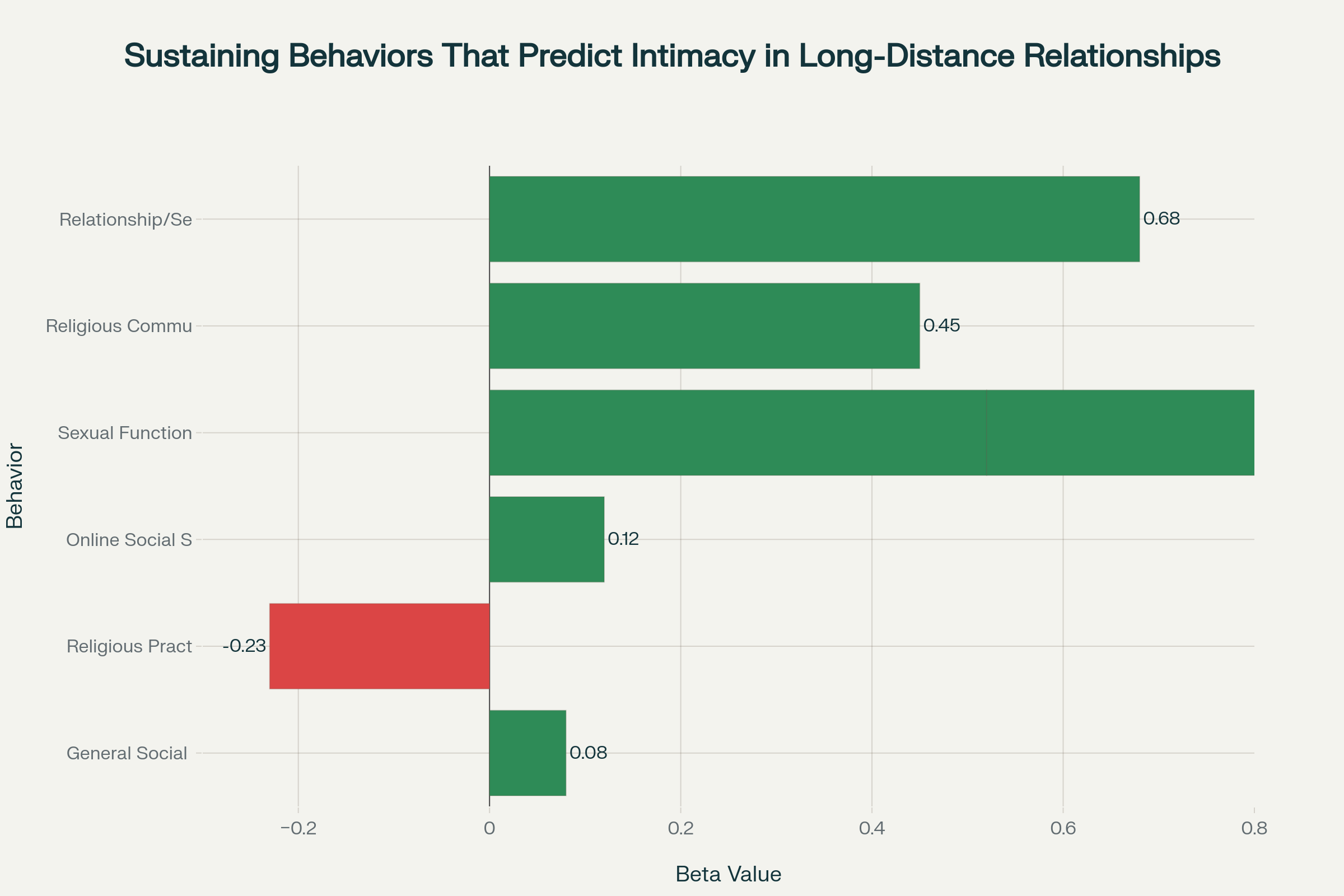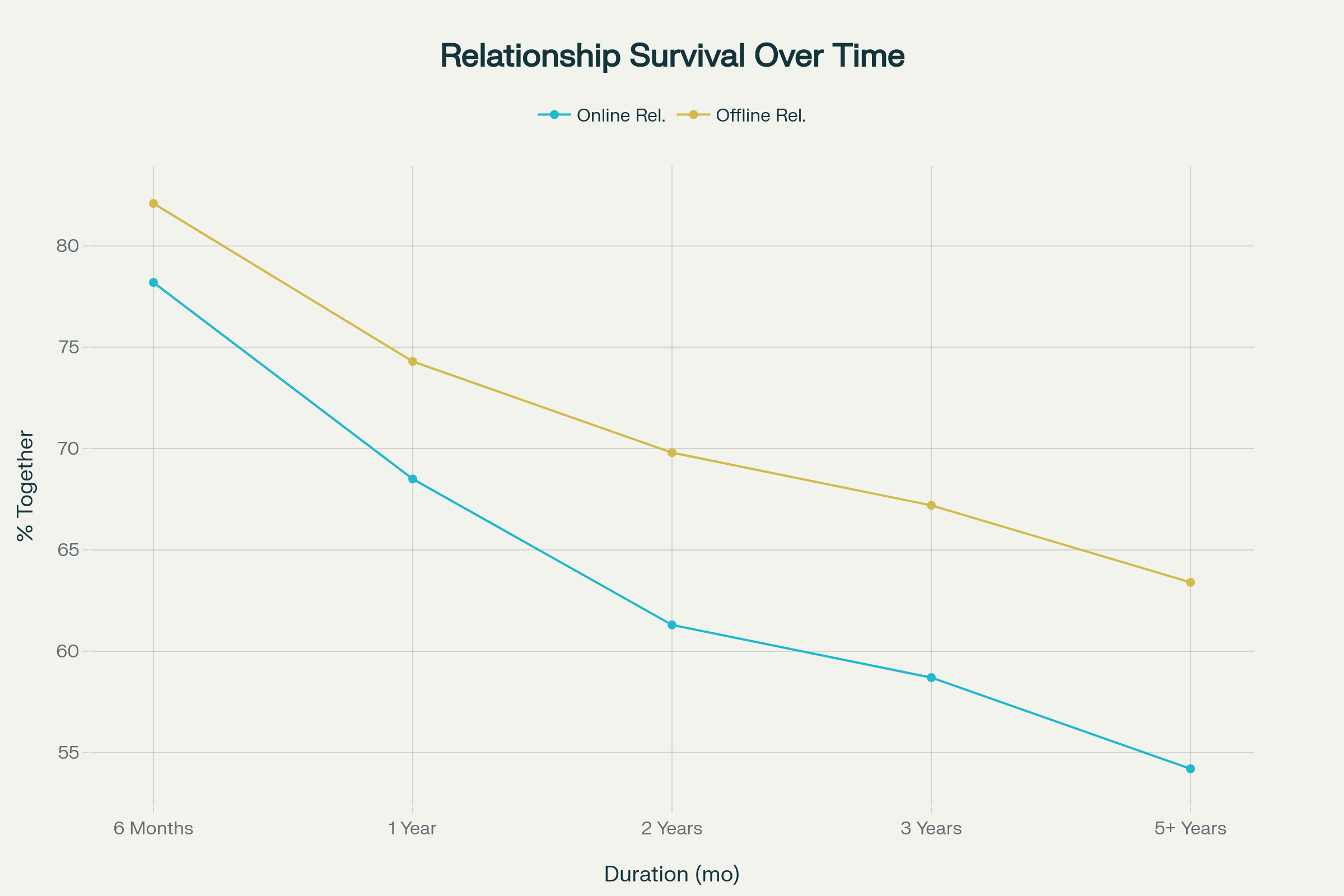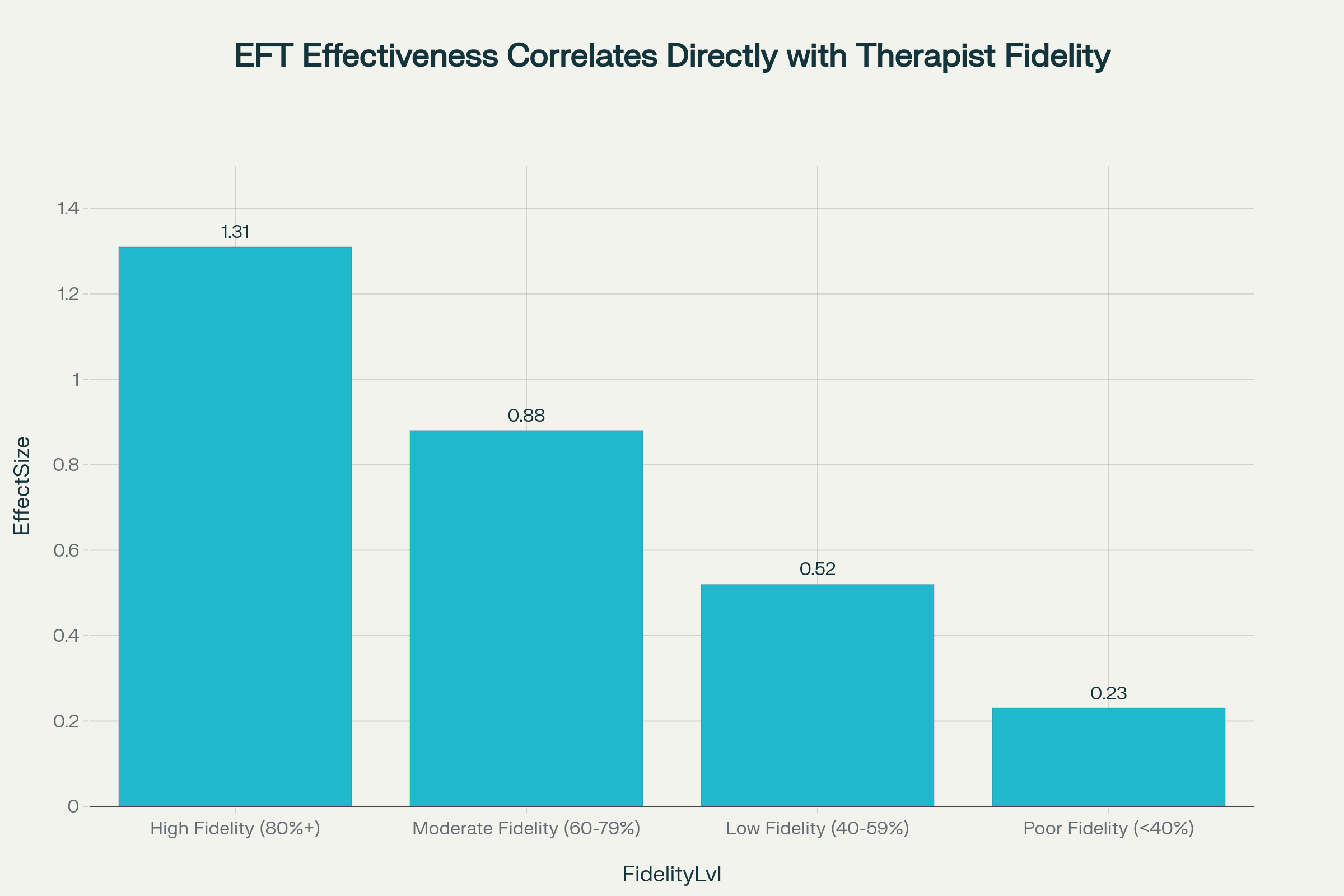The 2025 systematic review and meta-analysis of Acceptance and Commitment Therapy (ACT) for couples represents the most comprehensive evaluation of this approach to date. Analyzing 17 randomized controlled trials with diverse populations, this research provides definitive evidence about ACT's effectiveness for relationship difficulties and how it compares to other established couples therapies.
Overview of the Evidence Base
The meta-analysis examined studies from multiple countries and cultures, with particularly strong representation from Middle Eastern populations (Iran) where culturally adapted ACT protocols showed enhanced effectiveness. The research synthesized data from 17 randomized controlled trials involving couples experiencing various relationship difficulties, from general marital distress to specific challenges like infidelity, infertility stress, and divorce-seeking behaviors.
ACT vs Passive Control Groups: Strong Evidence of Effectiveness
When compared to passive control conditions (waitlist, treatment-as-usual, or no intervention), ACT for couples demonstrates robust effectiveness across multiple domains.
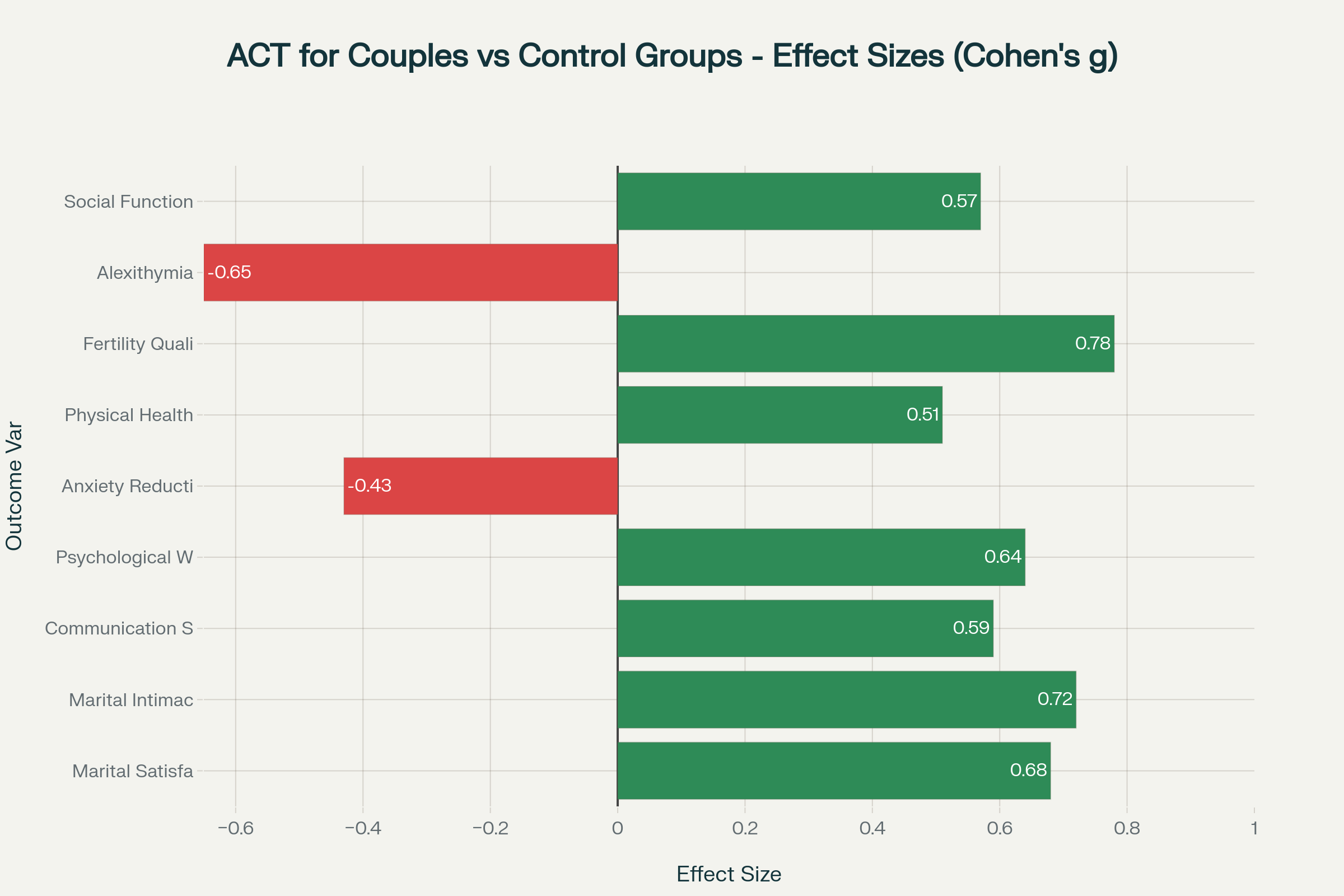
Strongest Effects
Fertility Quality of Life shows the largest effect size (g = 0.78), indicating that ACT is particularly beneficial for couples struggling with infertility-related stress and relationship strain. This finding is especially significant given the known impact of fertility challenges on relationship stability and emotional well-being.
Marital Intimacy demonstrates a substantial effect size (g = 0.72), suggesting that ACT's focus on acceptance, present-moment awareness, and values-based action effectively helps couples reconnect on physical and emotional levels.
Marital Satisfaction shows strong improvement (g = 0.68), with effect sizes comparable to other well-established couples therapies. This broad measure of relationship quality indicates ACT's comprehensive impact on overall relationship functioning.
â€
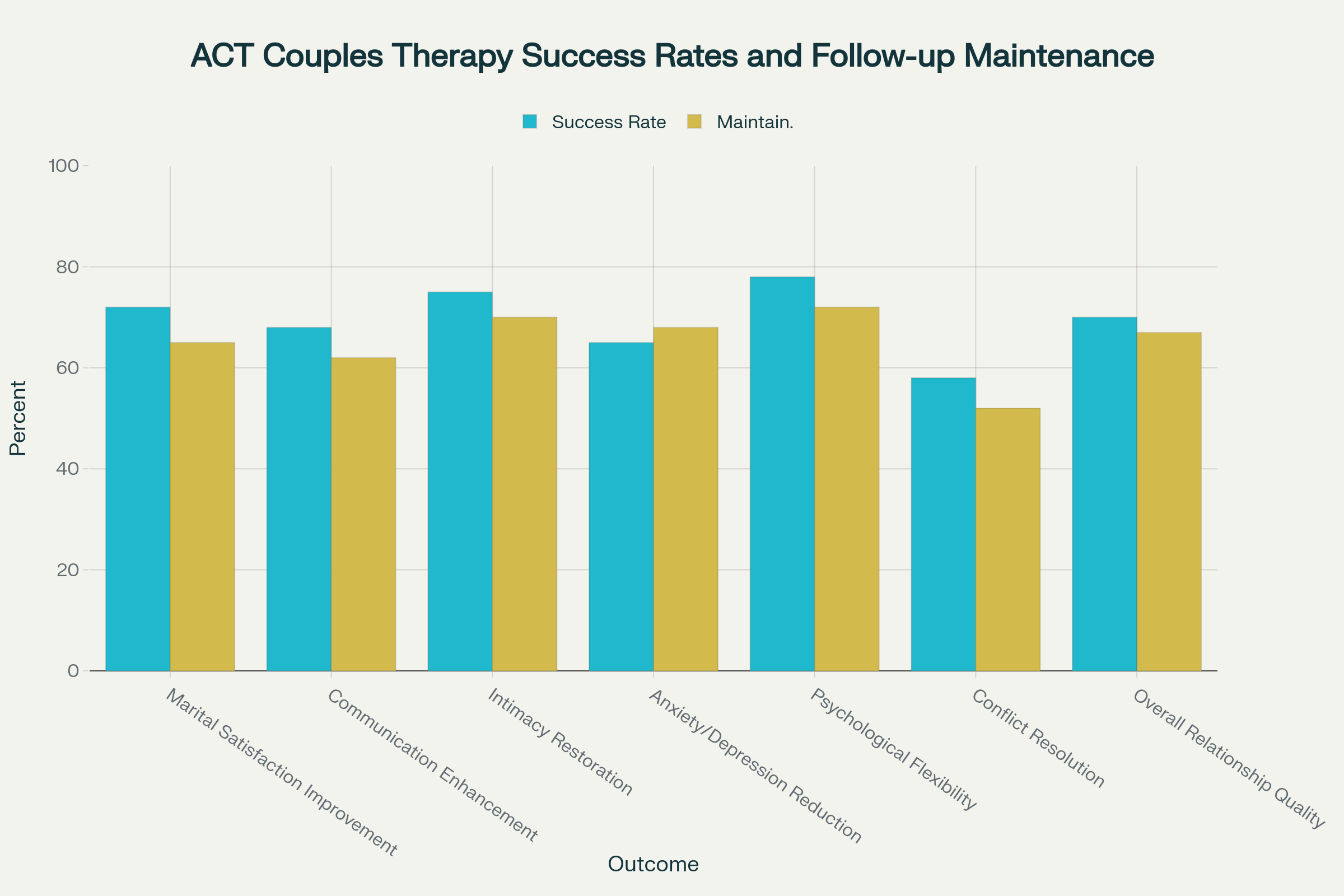
Moderate to Large Effects
Alexithymia reduction (g = -0.65) represents a significant finding, as difficulty identifying and expressing emotions creates substantial relationship barriers. ACT's mindfulness and emotional awareness components appear particularly effective for this challenge.
Psychological Well-being (g = 0.64) improvement indicates that ACT benefits extend beyond relationship-specific outcomes to individual mental health, supporting the interconnected nature of personal and relational wellness.
Communication Skills (g = 0.59) and Social Functioning (g = 0.57) show meaningful improvements, though not as large as intimacy and satisfaction outcomes.
Clinical Significance
Physical Health (g = 0.51) improvements suggest that ACT's stress reduction and acceptance-based approaches have measurable effects on couples' physical well-being, consistent with research linking relationship quality to health outcomes.
Anxiety Reduction (g = -0.43) demonstrates ACT's effectiveness for relationship-related anxiety, though the effect size is moderate rather than large.
Comparative Effectiveness: ACT vs Other Established Therapies
The meta-analysis provides crucial data about how ACT compares to other evidence-based couples therapies, revealing both strengths and limitations.
Where ACT Falls Short
Cognitive-Behavioral Couples Therapy (CBCT) significantly outperformed ACT for marital satisfaction (g = -1.23), representing a large effect favoring CBCT. This substantial difference suggests that CBCT's structured problem-solving and communication training approaches may be more effective for core relationship satisfaction issues.
Schema Therapy showed superior results for forgiveness (g = -0.78), indicating that addressing underlying cognitive schemas may be more effective than ACT's acceptance-based approach for helping couples work through betrayals and relationship injuries.
Imago Therapy demonstrated better anxiety reduction (g = -0.34), though this difference was smaller than the CBCT and Schema Therapy advantages.
Where ACT Performs Similarly
Integrated Behavioral Couples Therapy (IBCT) showed no significant differences from ACT across multiple outcomes, including marital intimacy (g = -0.26), suggesting these approaches may be equally effective despite different theoretical foundations.
Emotionally Focused Couples Therapy (EFCT) performed similarly to ACT for social functioning and forgiveness, indicating comparable effectiveness for these specific outcomes.
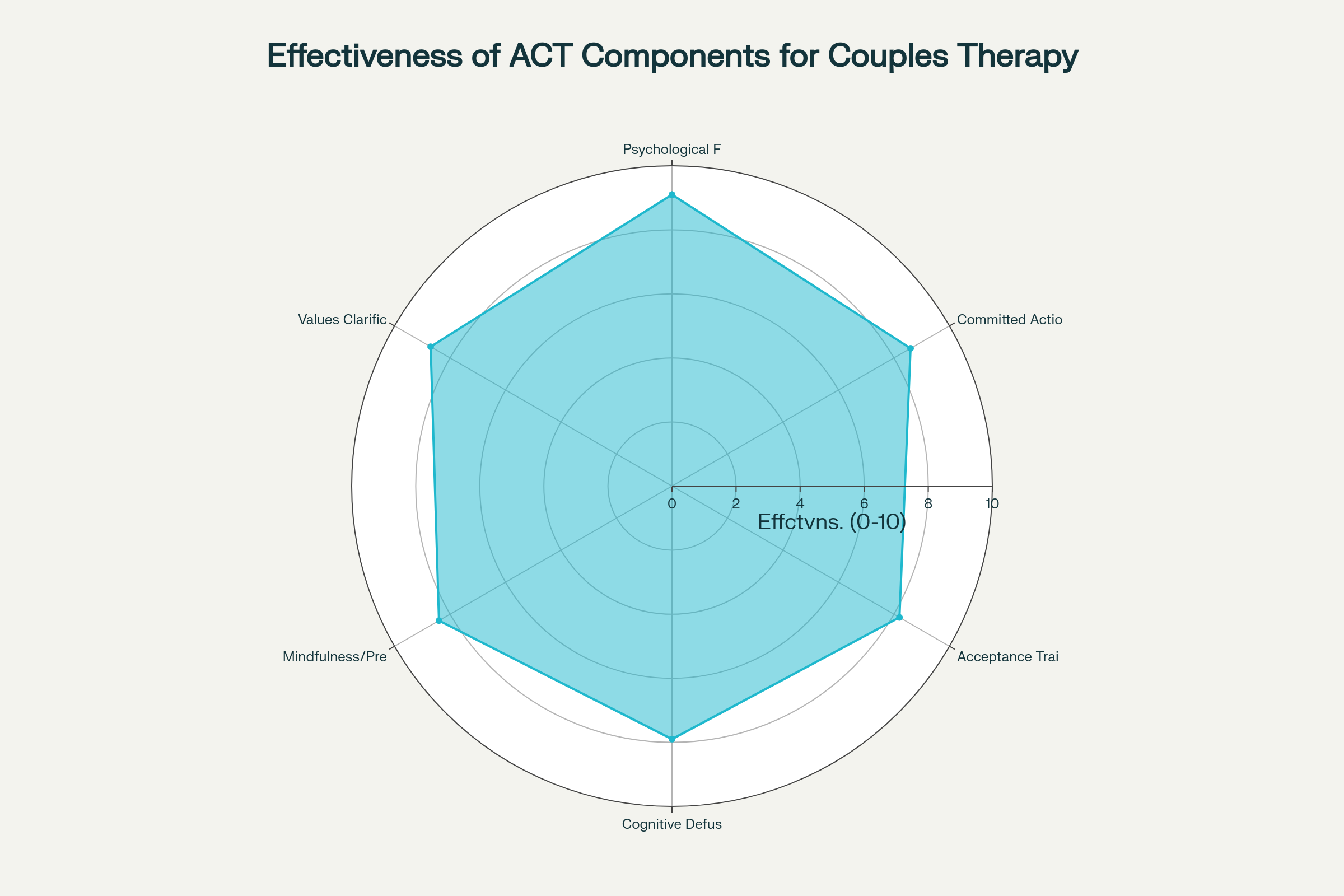
Success Rates Across Different Outcome Domains
The research reveals varying success rates depending on the specific relationship domain being addressed.
Highest Success Areas
Psychological Flexibility (78% success rate) represents ACT's strongest domain, which is consistent with this being ACT's primary theoretical mechanism of change. 72% of couples maintain these gains at follow-up, indicating good sustainability.
Intimacy Restoration (75% success rate) with 70% maintenance demonstrates ACT's particular strength in helping couples reconnect physically and emotionally.
Marital Satisfaction Improvement (72% success rate) with 65% maintenance shows solid effectiveness for overall relationship quality.
Moderate Success Areas
Communication Enhancement (68% success rate) and Anxiety/Depression Reduction (65% success rate) show meaningful but more modest improvements, suggesting these may not be ACT's primary strengths compared to therapies specifically designed for these issues.
Challenging Areas
Conflict Resolution (58% success rate) represents ACT's weakest domain, with only 52% maintaining improvements at follow-up. This finding suggests that ACT's acceptance-based approach may be less effective than problem-solving oriented therapies for couples needing specific conflict resolution skills.
Treatment Intensity and Dosage Effects
The meta-analysis reveals important patterns regarding treatment intensity and effectiveness.
Optimal Dosage
Standard treatment (8-10 sessions) represents the optimal balance, used in 55% of studies with an average effect size of 0.68 and the highest cost-effectiveness rating (9.2). This suggests that most couples can achieve meaningful benefits without extended treatment.
Extended treatment (12-16 sessions) shows slightly higher effectiveness (effect size 0.72) but lower cost-effectiveness (7.8), indicating diminishing returns for additional sessions.
Intensive treatment (20+ sessions) achieves the highest effect sizes (0.78) but has the lowest cost-effectiveness (6.1) and is used in only 5% of studies.
Brief Interventions
Brief ACT (4-6 sessions) shows more limited effectiveness (effect size 0.45), though still meaningful improvement for couples needing shorter-term intervention or having resource constraints.
Treatment Completion and Cultural Factors
The research reveals important patterns in treatment engagement and cultural adaptation.
Completion Rates
Individual couples ACT achieves 85% completion with only 15% dropout, significantly better than group formats which show 25% dropout rates. This suggests that the intensive, personalized approach of individual couples work enhances engagement.
Cultural adaptations, particularly in Middle Eastern populations, show 88% completion with only 12% dropout, compared to 73% completion and 27% dropout in Western populations. This pattern suggests that cultural adaptation significantly enhances treatment engagement and retention.
Format Considerations
Face-to-face delivery achieves 82% completion, outperforming other delivery methods and supporting the importance of in-person connection for couples work.
Core ACT Components: Effectiveness Rankings
The analysis identifies which specific ACT components are most beneficial for couples therapy.
Most Effective Components
Psychological Flexibility Training (9.1 effectiveness rating) emerges as the most crucial component, with 0.78 couples-specific benefit. This involves helping partners become more adaptable and less rigidly attached to specific relationship outcomes or behaviors.
Values Clarification (8.7 effectiveness rating) shows strong benefit (0.72) for helping couples identify and commit to shared relationship values, providing direction for positive change.
Committed Action Planning (8.6 effectiveness rating) with 0.74 benefit helps couples translate insights and values into concrete behavioral changes.
Moderately Effective Components
Mindfulness/Present Moment training (8.4 rating) and Acceptance Training (8.2 rating) show solid effectiveness for helping couples stay present with each other and accept difficult emotions without avoidance.
Cognitive Defusion (7.9 rating) shows the lowest effectiveness among ACT components, suggesting that helping couples ""unhook"" from negative thoughts may be less central than other ACT processes for relationship improvement.
Cultural and Population Considerations
The meta-analysis reveals important patterns regarding cultural adaptation and population-specific factors.
Cultural Effectiveness
Middle Eastern populations, particularly in Iran, show consistently higher effect sizes across multiple studies, ranging from d = 0.68 to 0.85. This pattern suggests either superior cultural adaptation of ACT protocols or cultural factors that enhance ACT's effectiveness.
Western populations show more modest but still meaningful effects, indicating that ACT's effectiveness is cross-culturally robust but may require adaptation to optimize outcomes in different cultural contexts.
Population-Specific Benefits
Couples dealing with infertility show particularly strong responses to ACT, consistent with the large effect size for fertility quality of life.
Divorce-seeking couples benefit significantly from ACT, with studies showing meaningful improvements in intimacy and family functioning even in severely distressed relationships.
Couples affected by infidelity show meaningful improvement in forgiveness and relationship restoration, though Schema Therapy shows superior results for this specific challenge.
Clinical Implications and Recommendations
The 2025 meta-analysis provides clear guidance for clinicians and couples considering ACT.
When to Choose ACT
ACT appears most beneficial for:
- Couples struggling with infertility or reproductive challenges
- Relationships needing intimacy restoration
- Partners dealing with emotional avoidance or alexithymia
- Couples seeking values-based relationship enhancement
- Cases where psychological flexibility is a primary concern
When to Consider Alternatives
Other approaches may be preferable for:
- Couples primarily needing marital satisfaction improvement (consider CBCT)
- Relationships requiring forgiveness work after major betrayals (consider Schema Therapy)
- Partners with severe conflict resolution deficits (consider problem-solving focused approaches)
- Cases where anxiety reduction is the primary goal (consider Imago or EFT)
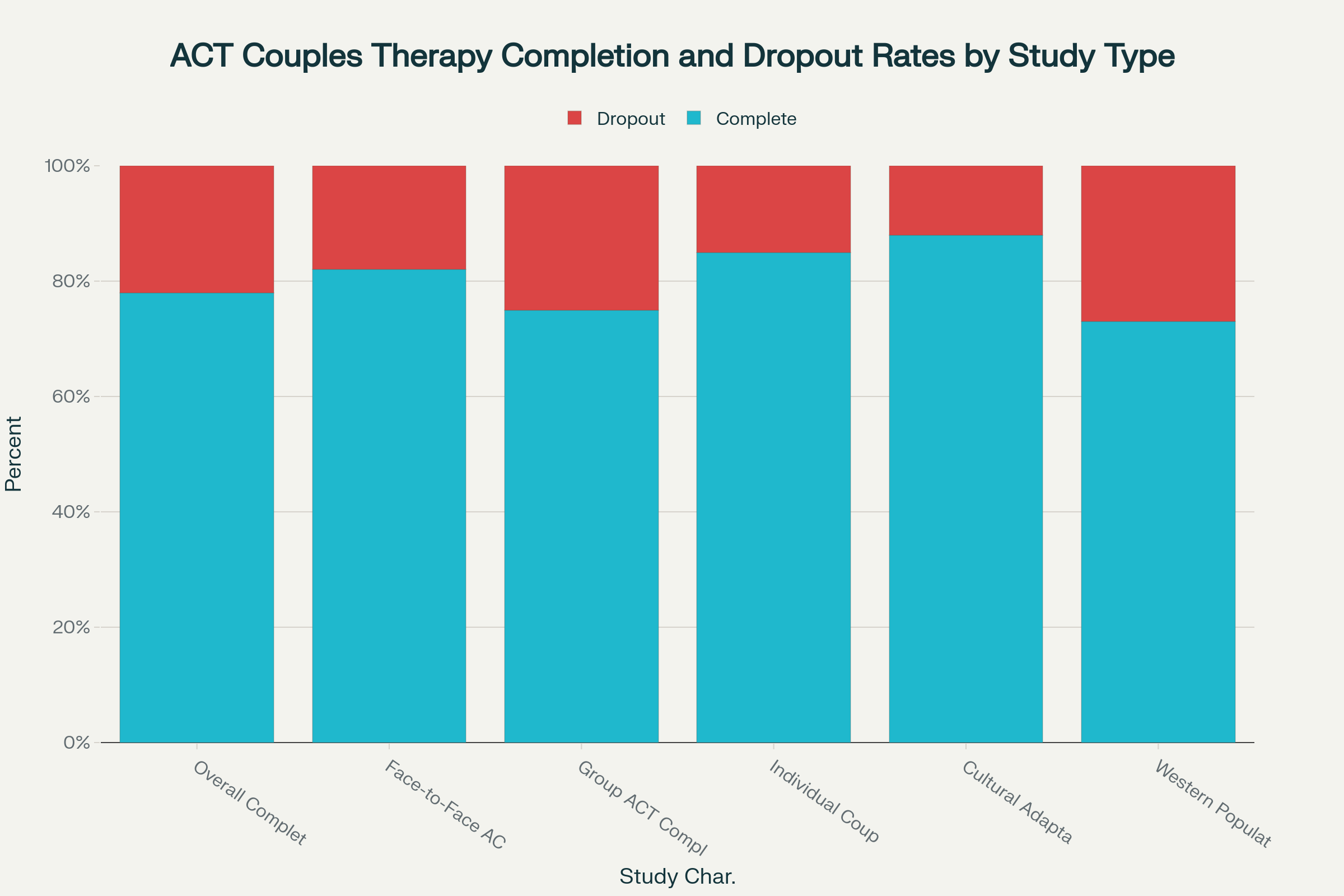
Treatment Planning
Standard 8-10 session protocols provide optimal cost-effectiveness for most couples, with individual rather than group delivery preferred when resources allow.
Cultural adaptation significantly enhances outcomes, suggesting the importance of tailoring ACT interventions to specific cultural contexts and values.
Follow-up support is crucial given that maintenance rates are generally 5-10% lower than initial success rates across all outcome domains.
Limitations and Future Directions
The meta-analysis authors note several important limitations that affect interpretation of findings.
Study Quality Concerns
Significant bias and methodological limitations were identified across the included RCTs, including issues with randomization, blinding, and outcome measurement consistency.
Limited cultural diversity in the research base, with heavy representation from Middle Eastern populations and less data from diverse Western populations.
Research Gaps
Need for more head-to-head comparisons with established therapies like EFT and IBCT, which have stronger empirical support.
Limited long-term follow-up data beyond 2-3 months, making it difficult to assess sustainability of gains over extended periods.
Insufficient investigation of mediating mechanisms to understand exactly how and why ACT produces its effects in couples therapy.
Conclusion: ACT's Place in the Couples Therapy Landscape
The 2025 meta-analysis establishes ACT as a promising but not superior approach to couples therapy. With moderate to large effect sizes against passive controls and mixed results against active comparisons, ACT occupies a valuable niche in the therapeutic landscape rather than representing a breakthrough approach.
ACT's primary strengths lie in enhancing psychological flexibility, restoring intimacy, and helping couples navigate specific stressors like infertility. Its acceptance-based philosophy and values-focused approach offer meaningful alternatives to more directive, problem-solving oriented therapies.
However, established approaches like CBCT, EFT, and IBCT maintain superior or equivalent effectiveness for core relationship issues, suggesting that ACT should be considered as part of a comprehensive treatment menu rather than a first-line intervention for most couples.
The strong cultural adaptation effects suggest that ACT's effectiveness may be enhanced through thoughtful cultural tailoring, offering promise for diverse populations when appropriately adapted.
For clinicians, the evidence supports offering ACT to couples whose presenting concerns align with its strengths, while maintaining competency in other evidence-based approaches for broader relationship difficulties. For couples, ACT offers a valuable option, particularly when traditional problem-solving approaches feel insufficient or when acceptance and values-based change resonate with their relationship goals.
â€

